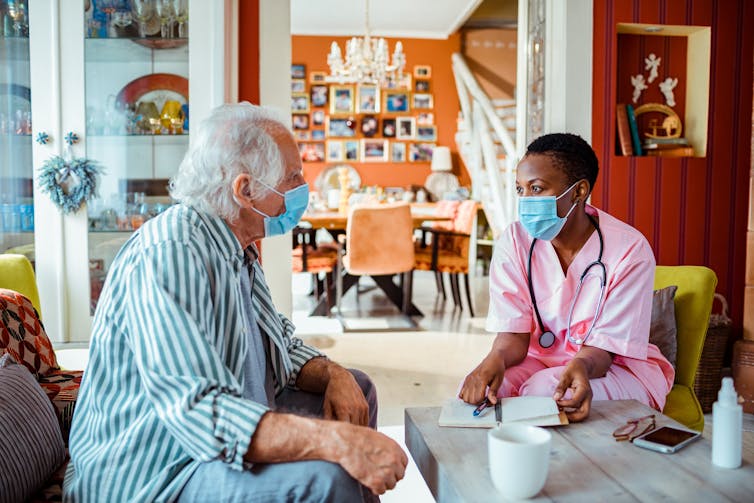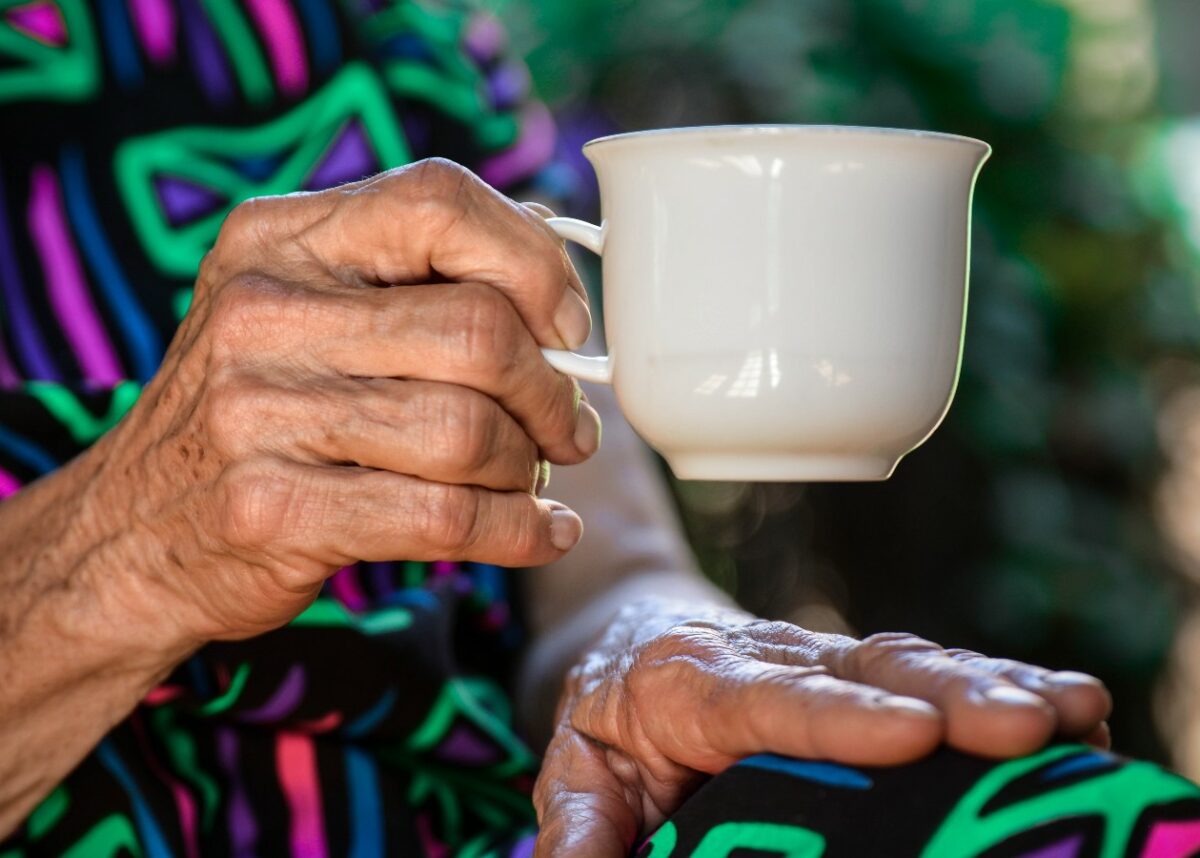Nancy Kusmaul, University of Maryland, Baltimore County
For older adults, social isolation may have dredged up past traumas that are difficult to come back from. And for those living in nursing homes that have been the center of outbreaks throughout the COVID-19 pandemic, these new traumas can make resuming care as usual even more difficult.
Older adults more vulnerable to COVID-19 stayed home out of fear. People in nursing homes were further isolated when the Centers for Medicare & Medicaid Services required nursing homes to stop outside visitation and group activities in the interest of public safety. Full closure lasted six months, with gradual reopening. Some states chose to keep more restrictive measures in place for much longer.
Not only did residents lose their right to visitors and contact with the rest of the world, but nursing home staff were covered in personal protective equipment that made it harder to connect because of communication challenges. In addition, staff were busier than ever because of staff shortages and greater care demands, leaving little time to provide social support.
Isolation, emotional neglect and fear of life-threatening disease can be traumatic in their own right. Furthermore, they can exacerbate past traumas that caregivers may not be aware of.
I am an associate professor of social work at the University of Maryland, Baltimore County, and my research focuses on quality of life and care in nursing homes. As nursing homes begin recovering from COVID-19, it will be important to address both the trauma residents and staff endured during the pandemic, as well as past traumas they may have endured.

What is trauma?
Psychological trauma results from exposure to abuse, disasters, violence and other harmful or life-threatening events that are often out of one’s control. These events can have lasting adverse effects on mental, physical, social, emotional or spiritual well-being. People with a history of trauma report more distress and pain in medical settings, and are more likely to be anxious, depressed and distrustful when receiving medical care. These factors make it more difficult for them to engage with providers and respond to care.
Trauma-informed care is especially relevant to older adults. They have a greater risk of having experienced something traumatic by virtue of the fact that they have been around longer. Older adults are also likely to have experienced potentially traumatic loss of their loved ones or physical abilities. Furthermore, many older people grew up during a time when trauma and other mental health challenges were often not addressed due to heavy stigma. These unresolved issues may resurface when faced with the additional challenges of aging, including end of life.
What is trauma-informed care?
Trauma-informed care is an approach that takes a person’s past traumatic experiences into consideration when providing care and creates services that minimize re-traumatization. It’s currently used in a variety of settings, such as education, mental health, health care and criminal justice. https://www.youtube.com/embed/fWken5DsJcw?wmode=transparent&start=0 Trauma-informed care recognizes that life experiences play a role in an individual’s health and well-being.
It’s particularly useful when there are power differentials between clients and providers. These include situations where the provider can control which programs or services a client can access, or by the type of report they provide on the client’s progress. Organizations that are trauma-informed work to flatten their power structure, meaning that hospitals, social service agencies and nursing homes give their patients and clients the ability to choose how they receive services.
Organizations also work to make their clients and staff feel safer in a variety of ways:
- Ensuring the safety of their care settings. This is not always easy or one size fits all. For example, locked doors will make some people feel safer and others less safe.
- Fostering trust through transparency. Organizations will hold high expectations for care, but also give their staff the tools to work independently and make decisions without micromanaging.
- Offering opportunities to connect with people in similar situations. This may include social events, mentoring and group therapy or self-help.
- Collaborating in service provision. This involves a “doing with,” rather than serving or “doing for” mentality. For example, instead of scheduling an appointment on a client’s behalf, staff may provide contacts at local agencies and help the client to call and set up services on their own.
- Empowering clients and staff. Clients and staff have a voice in deciding how they want to work with each other. This could include having a variety of times that services are available, virtual or in-person meetings and the ability to choose their provider.
- Respectful of identity. Organizations take into account cultural, historical and gender issues that may have affected how someone has previously been treated. This is particularly important when working with older adults, who may have had a lifetime of discrimination and past trauma.
Trauma-informed care is still in its early stages when it comes to older adults. End-of-life and hospice care settings are in the process of implementing it, and it is required but not yet fully integrated in nursing homes.

Trauma-informed care starts with staff
The COVID-19 pandemic has had significant psychosocial effects on older adults in nursing homes and in the community. Residents and families need to trust nursing homes again. Care that incorporates the principles of trauma-informed care and takes each individual’s unique life experiences into account is essential for older adults with potentially traumatic life experiences, especially in light of the potential trauma caused by a global pandemic.
For older adults in long-term care settings, organizations can take steps to ensure that residents feel safe both from the threat of disease and isolation. This starts with supporting their staff.
[Over 100,000 readers rely on The Conversation’s newsletter to understand the world. Sign up today.]
Trauma-informed nursing homes need to ensure their that workers have access to personal protective equipment and health care to mitigate disparities. Racial and ethnic minorities are over-represented among direct care workers and may need trauma-informed care themselves to be able to provide trauma-informed care to residents. Without trauma-informed care at all levels, staff will burn out and shortages will worsen.
Nursing home staff that feel supported in their efforts are essential to collaborative, quality care. Trauma-informed care goes both ways.
Nancy Kusmaul, Associate Professor of Social Work, University of Maryland, Baltimore County
This article is republished from The Conversation under a Creative Commons license. Read the original article.












